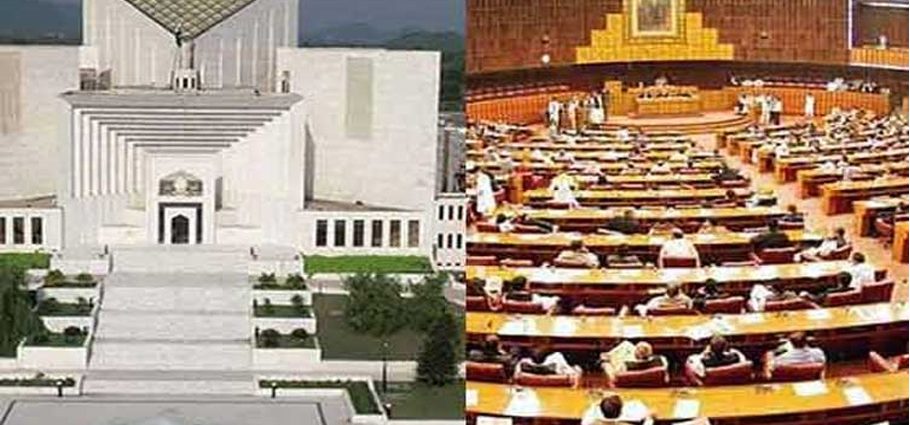The Practice and Procedure Act is inconsistent with the Constitution, Justice Shahid Waheed’s dissenting note
If allowed to resort to Article 191, judicial matters can also be interfered with through ordinances.
Extension of judicial jurisdiction is possible only through constitutional amendment, no new jurisdiction can be assigned to a court by simple legislation.
The majority of the bench reached a wrong conclusion which is not correct according to the Constitution.
Article 184/3 petitions can be decided in the court itself, Judges Committee cannot administratively decide whether an application is admissible or not.
Sections 3 and 4 of the Practice and Procedure Act are inconsistent with each other, as per Section 184/3 Fundamental Rights case can be heard by a 3-member bench, dissenting note.
ISLAMABAD ( Web News)
Justice Shahid Waheed of the Supreme Court of Pakistan has issued a dissenting note in the Practice and Procedure Act case and said that the Practice and Procedure Act is in conflict with the Constitution, increasing judicial jurisdiction is possible only through constitutional amendment. Is. Justice Shahid Waheed wrote in a dissenting note that if Article 191 is allowed to be resorted to, it will be possible to interfere in judicial matters through ordinances, the increase in judicial jurisdiction is possible only through constitutional amendment, simple legislation gives the court no new powers. Jurisdiction cannot be delegated. He said in the note that the judges committee will be able to make its own rules according to the practice and procedure, the 3-member committee of judges cannot correct the flaws in the practice and procedure by making rules, if no member of the judges committee is available. Who will replace him? The law is silent on this, according to the practice and procedure law, no other judge can replace a committee member. Justice Shahid Waheed said in a dissenting note that if 2 members of the committee decide to send the Chief Justice to the provincial registry, what will happen. ? The Chief Justice is the administrative head of the Supreme Court, the consequences of sending him to other provinces will be serious. If one member is sick and the other is out of the country, how will the benches be formed in emergency situations? He said that there is no answer to these questions in the law, nor can the Judges Committee come up with a solution for them. According to the Constitution, the decision to hear the petitions under Article 184/3 is possible only in the court. 184/3 can hear a case of fundamental rights as per section 3. He said in the note that section According to 4, only a 5-judge bench can interpret a case of fundamental rights, Section 3 allows for hearing and constitutional interpretation while Section 4 prohibits, every other Supreme Court case requires interpretation of the Constitution, case by case. But if a five-member bench is formed, how will the pending 50,000 cases be decided? From this point, it would be clear that the practice and procedure law will become a big obstacle in the delivery of justice. Justice Shahid Waheed said in a dissenting opinion that the justice system is the backbone for the rule of law, it is necessary for the rule of law to The Judiciary should be allowed to function independently without any interference, the independence and autonomy of the judiciary cannot be compromised, the Practice and Procedure Act is inconsistent with the Constitution. The dissenting note said that the majority of the bench reached a wrong conclusion which is in accordance with the Constitution. Not true, the purpose of the dissenting note is to correct this mistake in future, the purpose of the Practice and Procedure Act is to curb the independence of the judiciary and its affairs, Article 184/3 jurisdiction is given in the Constitution, Article 175( 2) Does not allow the Parliament to make any law, Article 175(2) deals with judicial jurisdiction. He said that no law can override the right to make rules given to the court in the constitution. Parliament also has no authority to make laws that conflict with the constitution. Allowing parliament to interfere in the administrative affairs of the court is against the constitutional division of powers. If the government creates arbitrary benches in certain cases, it will be against the independence of the judiciary.

